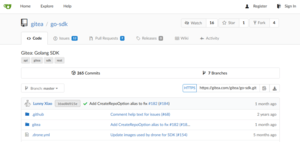Gitea
Gitea is an open-source forge software package for hosting software development version control using Git as well as other collaborative features like bug tracking, wikis and code review. It supports self-hosting but also provides a free public first-party instance hosted on DiDi's cloud.[3] It is a fork of Gogs[4] and is written in Go.[5] Gitea can be hosted on all platforms supported by Go[6] including Linux, macOS, and Windows.[7][8] The project is funded on Open Collective.[9]
 | |
 A screenshot of a Gitea repository | |
| Initial release | 23 December 2016[1] |
|---|---|
| Stable release | 1.12.3
/ July 28, 2020[2] |
| Repository | |
| Written in | Go |
| Available in | English |
| Type | Collaborative version control (forge) |
| License | MIT License |
| Website | gitea |
History
Gitea was created by a group of users and contributors of the self-hosted Git service Gogs. Though Gogs was an open source project, its repository was under the sole control of a single maintainer, limiting the amount of input and speed with which the community could influence the development. Frustrated by this, the Gitea developers began Gitea as a fork of Gogs in November of 2016 and established a community-driven model for its development.[4] It had its official 1.0 release the following month, December of 2016.[1]
See also
- Source control
- Distributed version control
- Self hosting
- Comparison of source code hosting facilities
- Open-source software
- GitHub
- GitLab
- Bitbucket
References
- "The Gitea 1.0 release blog post". Retrieved 9 September 2019.
- "Releases - go-gitea/gitea". Retrieved 30 July 2020 – via GitHub.
- https://gitea.com/
- "Welcome to Gitea - Blog". blog.gitea.io.
- Krill, Paul (January 4, 2017). "Developers pick up new Git code-hosting option". InfoWorld.
- "Install gitea on openSUSE using the Snap Store". Snapcraft.
- "Slant - GitKraken vs Gitea detailed comparison as of 2019". Slant.
- "Gitea is all grown up: What's new in version 1.7.0". January 28, 2019.
- "gitea - Open Collective". opencollective.com.